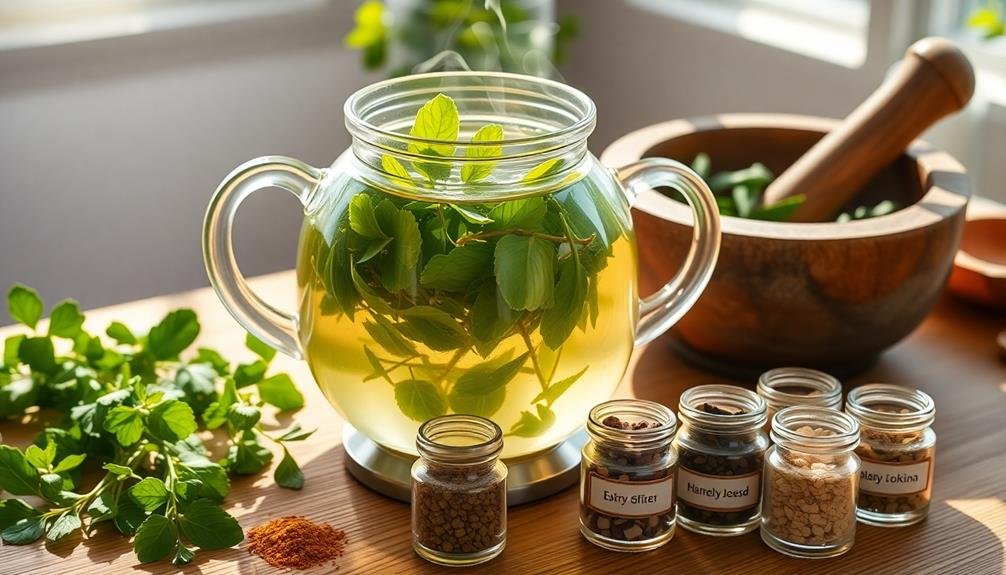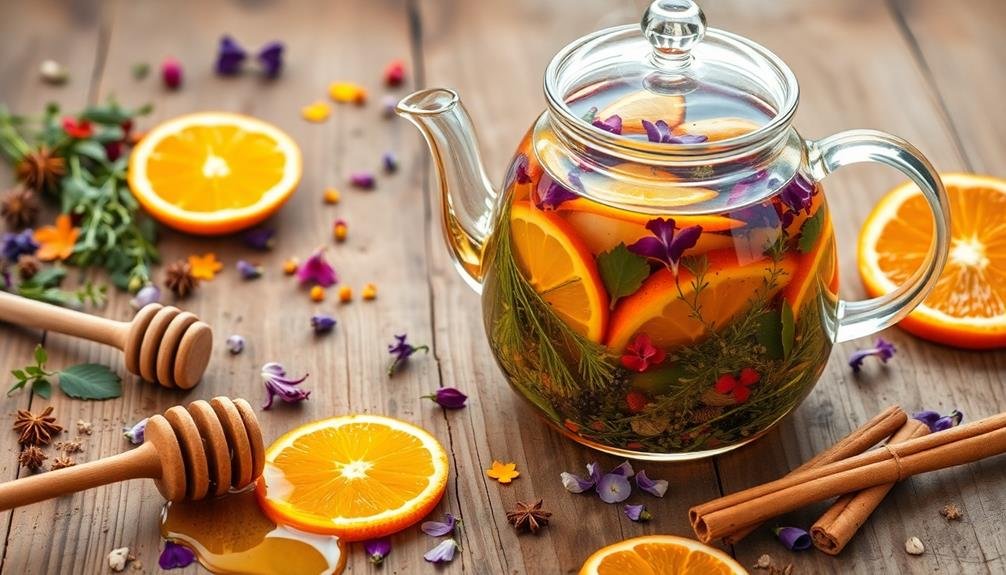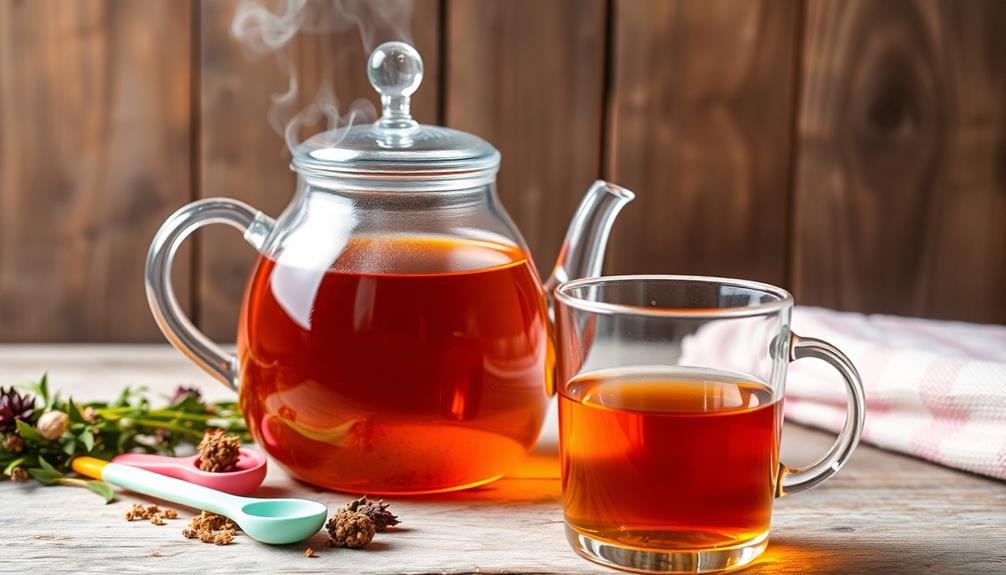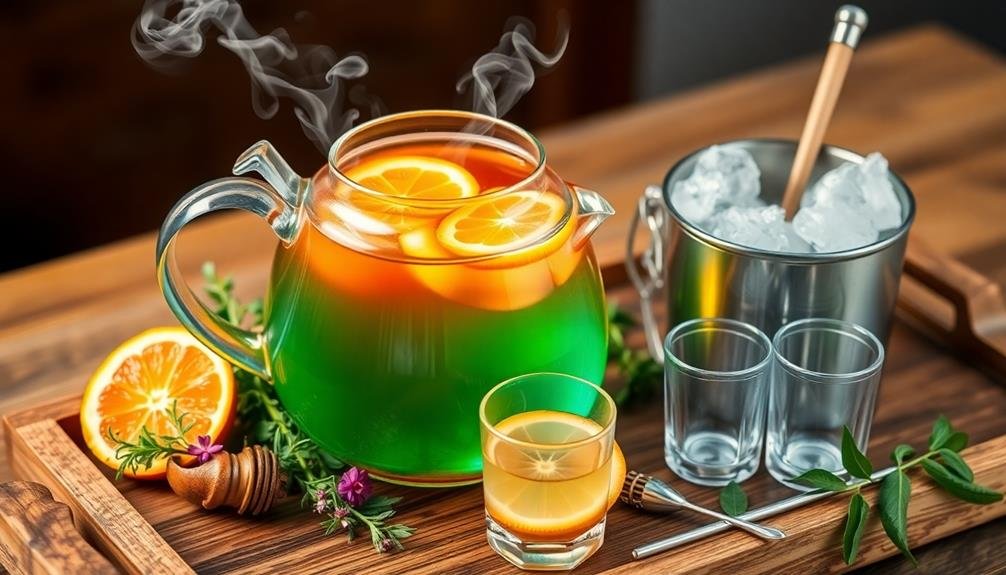To create potent herbal tea concentrates at home, start by selecting high-quality, fresh herbs for maximum flavor and potency. Master the steeping process by using the right water temperature and steeping time for each herb. Don't be afraid to experiment with unique flavor combinations to discover exciting blends. Store your concentrates properly in airtight containers away from light and heat. Perfect your dilution ratios for the ideal taste, and enhance flavors with natural sweeteners. Get creative with serving suggestions, from iced tea to cocktails. These tips will help you elevate your herbal tea game and reveal a world of aromatic possibilities.
Choose High-Quality Herbs

Three key factors determine the quality of herbs for your tea concentrate: freshness, purity, and potency. When selecting herbs, opt for those that are vibrant in color and aromatic. Fresh herbs will yield more flavor and beneficial compounds in your concentrate. Avoid herbs that appear dull, discolored, or have a musty odor.
Purity is essential, so choose organic herbs whenever possible. These are free from pesticides and other harmful chemicals that could compromise the quality of your concentrate. If organic options aren't available, thoroughly wash non-organic herbs before use.
Potency refers to the concentration of active compounds in the herbs. Wildcrafted herbs often have higher potency due to their natural growing conditions. However, cultivated herbs from reputable sources can be equally potent if grown and harvested properly.
Consider purchasing whole herbs rather than pre-ground ones. Whole herbs retain their essential oils and active compounds better, resulting in a more flavorful and effective concentrate. If you must use pre-ground herbs, verify they're from a trusted supplier and stored in airtight containers to maintain freshness.
Lastly, research the best harvesting times for specific herbs, as this can greatly impact their potency and flavor profile in your tea concentrate.
Master the Steeping Process
Despite its apparent simplicity, mastering the steeping process is essential for creating a potent herbal tea concentrate. You'll need to pay attention to several key factors to extract the maximum flavor and benefits from your herbs. Water temperature, steeping time, and the herb-to-water ratio all play significant roles in the final product's potency.
For most herbal teas, you'll want to use water that's just off the boil, around 200°F (93°C). This temperature helps release the herbs' essential oils and compounds without scorching them. As for steeping time, it varies depending on the herbs you're using. Generally, you'll want to steep your concentrate for 10-15 minutes, but some herbs may require longer.
To create a truly potent concentrate, follow these steps:
- Use 1-2 tablespoons of dried herbs per cup of water
- Cover your steeping container to prevent volatile oils from escaping
- Stir the mixture occasionally to promote even extraction
- Strain the concentrate through a fine-mesh sieve or cheesecloth
Experiment With Flavor Combinations

Once you've mastered the steeping process, it's time to explore the world of flavor combinations. Start by pairing complementary herbs and spices to create unique blends.
Try mixing chamomile with lavender for a soothing nighttime concentrate, or combine peppermint and ginger for an invigorating digestive aid.
Don't be afraid to experiment with unexpected ingredients. Add a pinch of cinnamon or cardamom to green tea for a warming twist, or infuse your black tea concentrate with vanilla bean and star anise for a rich, complex flavor.
Citrus zest can brighten up any blend, while a touch of honey or maple syrup can balance out bitter notes.
Consider the purpose of your concentrate when selecting flavors. For an energy boost, combine yerba mate with lemongrass and rosemary. If you're looking for a calming blend, mix passionflower with lemon balm and skullcap.
Keep a journal of your experiments to track successful combinations and refine your recipes over time. Remember, the key to creating exceptional herbal tea concentrates lies in finding the perfect balance of flavors that suit your palate and meet your specific needs.
Proper Storage Techniques
To keep your herbal tea concentrates fresh and potent, you'll need to master proper storage techniques.
Always store your concentrates in airtight containers to prevent oxidation and preserve their flavors.
Place these containers in cool, dark places away from direct sunlight and heat, and guarantee a moisture-free environment to prevent mold growth and maintain the concentrate's quality.
Airtight Containers
Storing your herbal tea concentrate in airtight containers is crucial for maintaining its freshness and potency over time. When choosing containers, opt for glass or high-quality food-grade plastic that won't absorb odors or flavors. Make sure the lids seal tightly to prevent air from entering and compromising your concentrate.
Before filling your containers, sterilize them thoroughly to eliminate any bacteria or contaminants. Fill them to the brim, leaving minimal air space to reduce oxidation. Label each container with the concentrate's name and date of preparation for easy identification and tracking.
For peak storage, consider these additional tips:
- Store containers in a cool, dark place away from direct sunlight.
- Use smaller containers for frequently accessed concentrates to minimize air exposure.
- Consider vacuum-sealing containers for extended storage periods.
- Refrigerate opened containers to prolong shelf life.
Cool, Dark Places
Preserving the quality of your herbal tea concentrate hinges on finding the perfect storage spot. Cool, dark places are ideal for maintaining the potency and flavor of your concoctions. You'll want to keep your concentrates away from direct sunlight, heat sources, and areas with temperature fluctuations.
Consider storing your herbal tea concentrates in a pantry, cupboard, or cellar. These locations offer consistent temperatures and protection from light. If you don't have a dedicated storage area, a drawer or shelf in a cool part of your home can work well. Remember, the refrigerator isn't always the best option, as some herbs may lose their potency when exposed to cold temperatures.
| Storage Location | Pros | Cons |
|---|---|---|
| Pantry | Dark, stable temp | Limited space |
| Cellar | Cool, consistent | Humidity risk |
| Kitchen cupboard | Convenient | Temp fluctuations |
| Refrigerator | Extends shelf life | Flavor changes |
| Drawer | Protects from light | Limited airflow |
Moisture-Free Environment
While finding a cool, dark place is important, ensuring a moisture-free environment is equally essential for your herbal tea concentrates.
Moisture can lead to mold growth and spoilage, compromising the quality and safety of your carefully crafted blends. To maintain a dry storage area, you'll want to control humidity levels and prevent condensation from forming.
Consider using airtight containers made of glass or food-grade plastic to store your concentrates. These containers will act as a barrier against moisture and help preserve the potency of your herbal blends.
You can also add silica gel packets to absorb any excess moisture that might find its way into the container.
Here are four additional tips to keep your herbal tea concentrates moisture-free:
- Use a dehumidifier in your storage area to control ambient humidity
- Keep concentrates away from water sources, such as sinks or kettles
- Avoid opening containers in steamy environments, like bathrooms
- Check for condensation regularly and address any moisture issues promptly
Dilution Ratios for Perfect Taste

Getting the right dilution ratio for your herbal tea concentrate is crucial in achieving the perfect taste. Start by experimenting with a 1:4 ratio of concentrate to water. This baseline allows you to modify according to your preferences and the strength of your concentrate.
For a stronger flavor, try a 1:3 ratio, which works well for robust blends like chai or ginger tea. If you prefer a milder taste, opt for a 1:5 or even 1:6 ratio. Remember that some herbal concentrates are more potent than others, so you'll need to adapt accordingly.
When serving iced tea, use a slightly stronger ratio to compensate for ice dilution. A 1:3 or 1:2 ratio works well for iced preparations.
For hot tea, you might want to start with a 1:4 ratio and adjust as needed.
Don't forget to take into account personal preferences and health factors. Some people may prefer a stronger taste, while others might need to limit their intake of certain herbs. Always read the label for any specific dilution recommendations provided by the manufacturer.
Keep track of your preferred ratios for different concentrates to guarantee consistent results every time you brew.
Enhancing With Natural Sweeteners
Natural sweeteners can elevate your herbal tea concentrate experience, adding depth and complexity to the flavor profile. When choosing a sweetener, consider how it complements the herbs in your concentrate. Honey, for instance, pairs well with chamomile or lavender, while maple syrup enhances the earthy notes of rooibos or cinnamon blends.
To incorporate natural sweeteners effectively, try these tips:
- Add sweeteners gradually, tasting as you go to avoid overpowering the herbal flavors.
- Warm your sweetener slightly before mixing to guarantee it dissolves evenly.
- Use liquid sweeteners like agave nectar for cold brews to prevent clumping.
- Experiment with flavored honeys or syrups to create unique taste combinations.
Don't limit yourself to traditional sweeteners. Explore alternatives like stevia leaves, monk fruit extract, or coconut sugar. These options can provide sweetness without drastically altering the concentrate's flavor profile.
Creative Serving Suggestions

Elevating your herbal tea concentrate experience goes beyond just brewing and sweetening.
Get creative with your serving methods to impress guests and enhance your enjoyment. Try freezing your concentrate into ice cubes, then add them to sparkling water for a revitalizing, slowly-infusing drink. You can also blend the concentrate with frozen fruit and yogurt for a healthy smoothie.
For a sophisticated twist, mix your herbal tea concentrate with sparkling wine or prosecco to create a unique cocktail. Garnish with fresh herbs or edible flowers for visual appeal.
If you're hosting a party, set up a DIY herbal tea concentrate bar with various flavors, mixers, and garnishes.
Don't limit yourself to just beverages. Use your concentrate in cooking and baking. Add it to marinades, salad dressings, or even baked goods for an unexpected flavor boost.
For a cool summer treat, make popsicles by mixing the concentrate with fruit juice and freezing.
Frequently Asked Questions
Can Herbal Tea Concentrates Be Used in Cooking or Baking?
Yes, you can use herbal tea concentrates in cooking and baking. They'll add unique flavors to your dishes. Try them in marinades, sauces, or baked goods. You'll discover new taste dimensions and enhance your culinary creations.
Are There Any Potential Side Effects of Consuming Strong Herbal Tea Concentrates?
You should be aware of potential side effects when consuming strong herbal tea concentrates. They can cause digestive issues, interact with medications, or trigger allergic reactions. It's best to start with small amounts and consult your doctor if you're concerned.
How Long Do Homemade Herbal Tea Concentrates Typically Last?
You'll find that homemade herbal tea concentrates typically last 3-5 days in the refrigerator. If you freeze them, they can stay good for up to 3 months. Always check for signs of spoilage before consuming.
Can I Mix Different Herbal Tea Concentrates Together?
Yes, you can mix different herbal tea concentrates together. It's a great way to create unique flavor combinations. You'll want to experiment with ratios to find the perfect blend. Be mindful of potential interactions between herbs, though.
Are There Specific Herbs to Avoid When Making Tea Concentrates?
You'll want to avoid toxic herbs like comfrey, ephedra, and belladonna when making tea concentrates. Be cautious with licorice root and kava kava too. Always research herbs thoroughly and consult an expert if you're unsure about safety.
In Summary
You've now got the tools to become a master herbal tea concentrate mixologist. Remember, quality ingredients and proper techniques are key. Don't be afraid to experiment with flavors and get creative with your presentations. Whether you're sipping solo or entertaining guests, these concentrated brews offer endless possibilities. Keep practicing, refining your skills, and you'll soon be crafting exceptional tea experiences that'll impress even the most discerning palates. Enjoy your journey into the world of herbal tea concentrates!





Leave a Reply